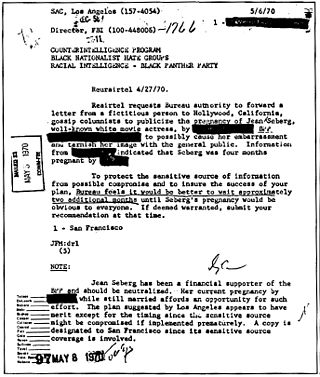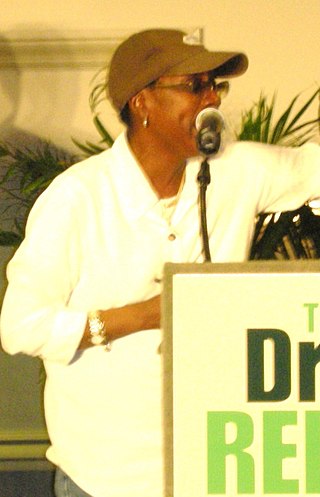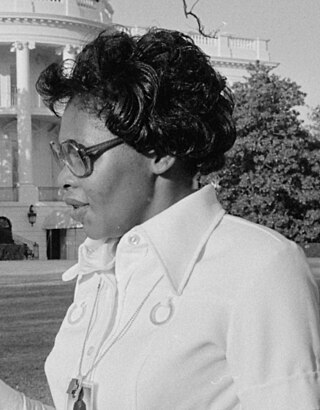
COINTELPRO was a series of covert and illegal projects actively conducted by the United States Federal Bureau of Investigation (FBI) aimed at surveilling, infiltrating, discrediting, and disrupting domestic American political organizations. FBI records show COINTELPRO resources targeted groups and individuals the FBI deemed subversive, including feminist organizations, the Communist Party USA, anti–Vietnam War organizers, activists of the civil rights and Black power movements, environmentalist and animal rights organizations, the American Indian Movement (AIM), Chicano and Mexican-American groups like the Brown Berets and the United Farm Workers, independence movements, a variety of organizations that were part of the broader New Left, and white supremacist groups such as the Ku Klux Klan and the far-right group National States' Rights Party.

Assata Olugbala Shakur is an American political activist who was a member of the Black Liberation Army (BLA). In 1977, she was convicted in the first-degree murder of State Trooper Werner Foerster during a shootout on the New Jersey Turnpike in 1973. She escaped from prison in 1979 and is currently wanted by the FBI, with a $1 million FBI reward for information leading to her capture, and an additional $1 million reward offered by the Attorney General of New Jersey.

Afeni Shakur Davis was an American political activist and member of the Black Panther Party. Shakur was the mother of rapper Tupac Shakur and the executor of his estate. She founded the Tupac Amaru Shakur Foundation and also served as the CEO of Amaru Entertainment, Inc., a record and film production company she founded.

The Black Liberation Army (BLA) was an underground Marxist-Leninist, black-nationalist militant organization that operated in the United States from 1970 to 1981. Composed of former Black Panthers (BPP) and Republic of New Afrika (RNA) members who served above ground before going underground, the organization's program was one of war against the United States government, and its stated goal was to "take up arms for the liberation and self-determination of black people in the United States." The BLA carried out a series of bombings, killings of police officers and drug dealers, robberies, and prison breaks.

Mutulu Shakur was a New Afrikan activist and a member of the Black Liberation Army who was sentenced to sixty years in prison for his involvement in a 1981 robbery of a Brinks armored truck in which a guard and two police officers were murdered.

The black power movement or black liberation movement was a branch or counterculture within the civil rights movement of the United States, reacting against its more moderate, mainstream, or incremental tendencies and motivated by a desire for safety and self-sufficiency that was not available inside redlined African American neighborhoods. Black power activists founded black-owned bookstores, food cooperatives, farms, media, printing presses, schools, clinics and ambulance services. The international impact of the movement includes the Black Power Revolution in Trinidad and Tobago.

Sundiata Acoli is an American political activist who was a member of the Black Panther Party and the Black Liberation Army. He was sentenced to life in prison in 1974 for murdering a New Jersey state trooper. Acoli was granted parole in 2022 at the age of 85.

Kuwasi Balagoon, born Donald Weems, was an American political activist, anarchist and member of the Black Panther Party and Black Liberation Army. Radicalised by race riots in his home state of Maryland growing up, as well as by his experiences while serving in the US Army, Weems became the black nationalist known as Kuwasi Balagoon in New York City in the late 1960s. First becoming involved in local Afrocentric organisations in Harlem, Balagoon would move on to become involved in the New York chapter of the Black Panther Party, which quickly saw him charged and arrested for criminal behaviour. Balagoon was initially part of the Panther 21 case, in which 21 panthers were accused of planning to bomb several locations in New York City, but although the Panther 21 were later acquitted, Balagoon's case was separated off and he was convicted of a New Jersey bank robbery.
Edna Mahan Correctional Facility for Women is a prison facility for women of the state of New Jersey Department of Corrections, located in Union Township, Hunterdon County, New Jersey, near Clinton. Its official abbreviation is EMCFW. The facility was named for Edna Mahan, one of the first female correctional superintendents in the U.S.
The Panther 21 is a group of twenty-one Black Panther members who were arrested and accused of planned coordinated bombing and long-range rifle attacks on two police stations and an education office in New York City in 1969, who were all acquitted by a jury in May 1971, after revelations during the trial that police infiltrators played key organising roles.

Various American fugitives in Cuba have found political asylum in Cuba after participating in militant activities in the Black power movement or the Independence movement in Puerto Rico. Other fugitives in Cuba include defected CIA agents and others. The Cuban government formed formal ties with the Black Panther Party in the 1960s, and many fugitive Black Panthers would find political asylum in Cuba, but after their activism was seen being repressed in Cuba many became disillusioned. House Concurrent Resolution 254, passed in 1998, put the number at 90. One estimate, c. 2000, put the number at approximately 100.
Nehanda Isoke Abiodun was an African American hip hop activist, black revolutionary, and fugitive who was living in Cuba. Abiodun was wanted by the FBI in connection of the 1981 robbery of a Brink's truck that resulted in the killing of a Brink's guard and two New York police officers. The United States federal government also charged Abiodun in connection with Assata Shakur's escape from prison, along with Susan Rosenberg.
Dhoruba al-Mujahid bin Wahad is an American writer and activist, Black Panther Party leader and co-founder of the Black Liberation Army. Dhoruba, in Swahili, means "the storm".

Akinyele Umoja is an American educator and author who specializes in African-American studies. As an activist, he is a founding member of the New Afrikan People's Organization and the Malcolm X Grassroots Movement. In April 2013, New York University Press published Umoja's book We Will Shoot Back: Armed Resistance in the Mississippi Freedom Movement. Currently, he is a Professor and Department Chair of the Department of African-American Studies at Georgia State University (GSU).

The Black Panther Party was an American Marxist–Leninist and black power political organization founded by college students Bobby Seale and Huey P. Newton in October 1966 in Oakland, California. The party was active in the United States between 1966 and 1982, with chapters in many major American cities, including San Francisco, New York, Chicago, Los Angeles, Seattle, and Philadelphia. They were also active in many prisons and had international chapters in the United Kingdom and Algeria. Upon its inception, the party's core practice was its open carry patrols ("copwatching") designed to challenge the excessive force and misconduct of the Oakland Police Department. From 1969 onward, the party created social programs, including the Free Breakfast for Children Programs, education programs, and community health clinics. The Black Panther Party advocated for class struggle, claiming to represent the proletarian vanguard.
Raymond A. Brown was an American criminal defense lawyer who represented a wide variety of high-profile clients, ranging from politicians to accused spies, including New Jersey state senator Angelo Errichetti, boxer Rubin "Hurricane" Carter and "Dr. X" physician Mario Jascalevich.

Mary Prince is an African American woman wrongly convicted of murder who then became the nanny for Amy Carter, the daughter of US President Jimmy Carter and his wife Rosalynn Carter, and was eventually granted a full pardon.

Assata's Daughters is an American black power organization of young radical African-American women and girls in Chicago, which operates through a Black, queer, feminist lens, that focuses on political education, organizing, and revolutionary services. The group is dedicated to radical liberatory activism in the tradition of Assata Shakur, a former member of the Black Liberation Army (BLA). The organization is often criticised for this connection, as Assata Shakur was convicted of first-degree murder, armed robbery, and other crimes in 1977 in the murder of a New Jersey State Trooper.
Eyes of The Rainbow is a 1997 documentary film by Gloria Rolando about Assata Shakur. The film was recorded in Cuba 33 years after Shakur's exile. The film consists primarily of a personal interview with Assata herself on the day her mother died as she recounts her experience as a prisoner in the United States. She reflects on the abuses she suffered as an inmate and the night she escaped from the correctional facility. The film encompasses the African Spirit Oya to illustrate the struggles Shakur has faced as a revolutionary. In the video Shakur talks about her life in Cuba, the influence of her grandmother as well as Afro-Cuban ancestry as a result of the African Diaspora.













